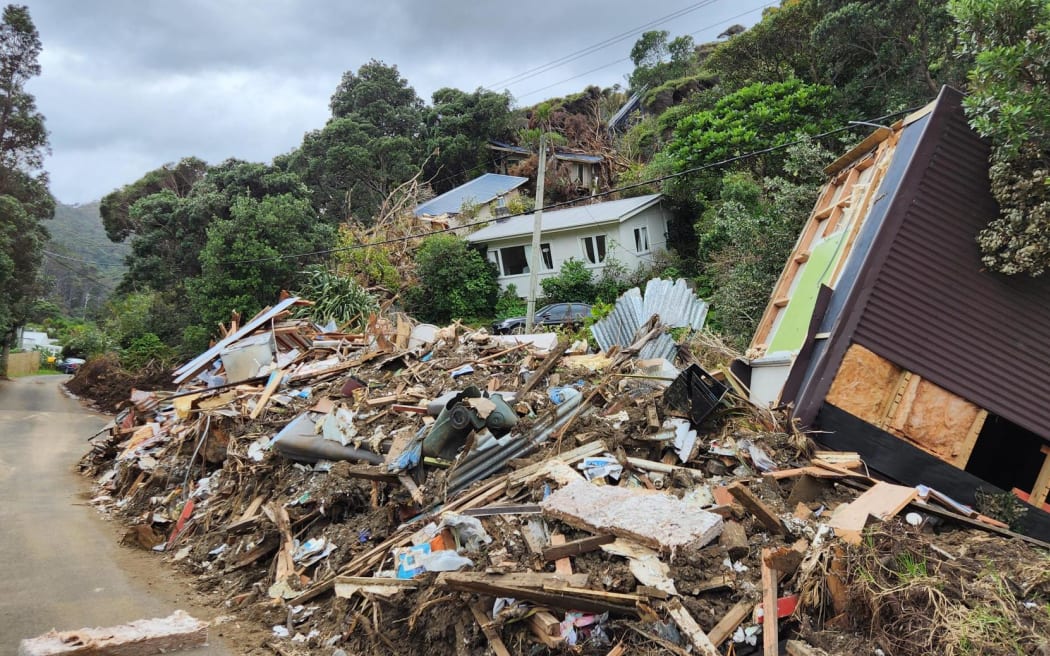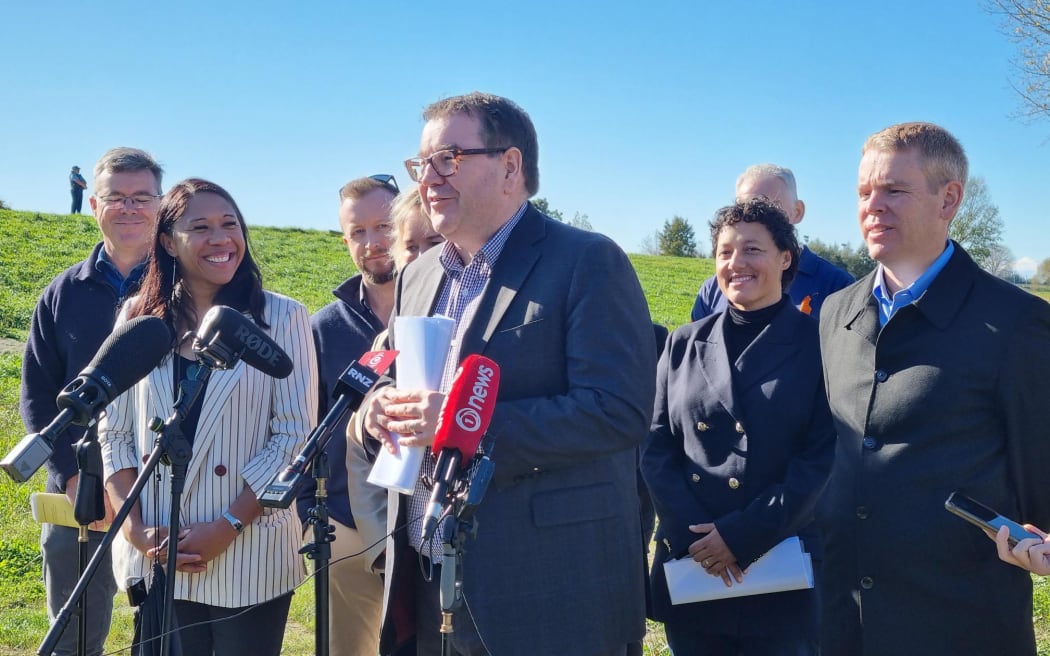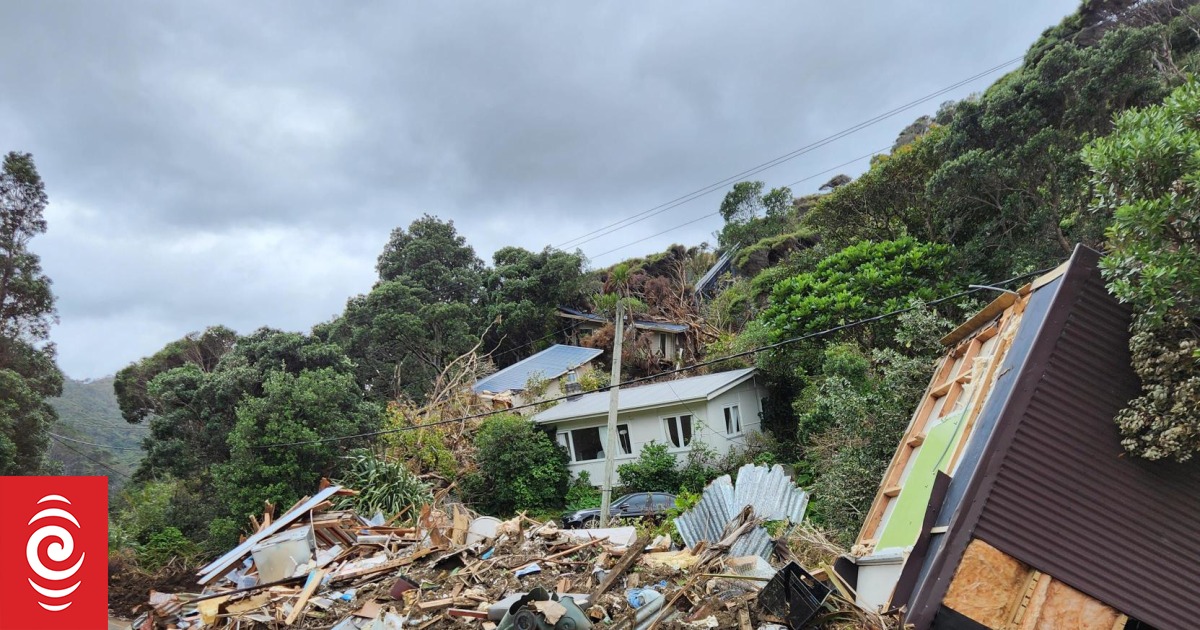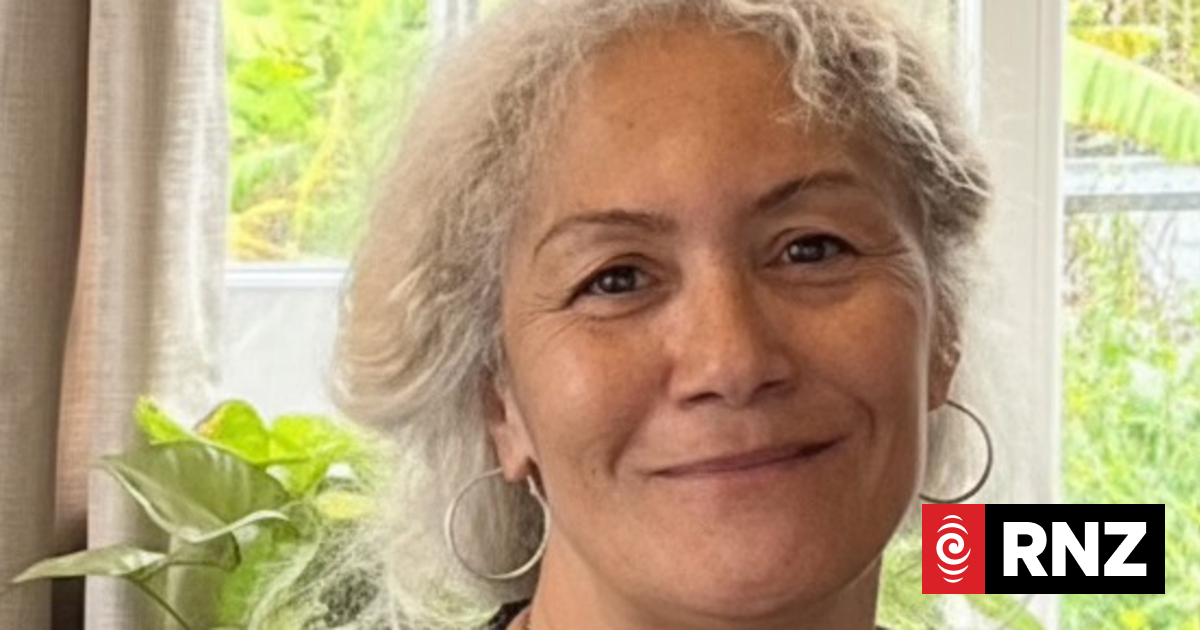
Private property, businesses, agriculture and infrastructure were all badly affected by Cyclone Gabrielle, with the cost believed to be up to $14.5 billion
Photo: RNZ / Finn Blackwell
Councils in some of the regions hit hardest by Cyclone Gabrielle are relieved the government is promising to pay for the repair job on local roads, so the cost will not fall back on ratepayers.
The government said the $941 million allocated from Budget 2023 was about covering the basics: repairing what had been damaged while also providing funds for protection against future events.
It acknowledged the recovery from Cyclone Gabrielle would be a long road, and frequently used the term ‘rolling maul’ to describe its support as new information and needs emerged.
“I want to acknowledge that for people in the local communities affected by the recent severe weather, they’ll be feeling frustrated. These things do take some time, we’re working as quickly as we can to get them the certainty that that they really deserve,” Prime Minister Chris Hipkins said at the announcement on Sunday.
Minister for Cyclone Recovery and Minister of Finance Grant Robertson said the recovery and rebuild would be led locally and supported centrally, and the package was what communities said they needed right now.
“Each community is affected differently. And that’s why we’ve taken a locally-led approach. We’re listening to those local communities about what they need. And they will find within this package things that they’ve all asked us about,” he said.
The bulk of the package would go toward fixing roads and rail.
Waka Kotahi and local councils would receive $275m to repair roads, while $200m would go toward the rail network.
“We understand that that’s something we can do. The roads all interconnect with one another, so it doesn’t make much sense for us to fix a state highway and then a local road not to be fixed. So that’s a way in which this announcement takes pressure off the local councils, when they’ve got a lot of pressure on them,” Robertson said.
The funds meant councils would not have to worry about increasing rates, the government said.
It was welcome news for Wairoa mayor Craig Little.
“Oh my god, yes. We’re looking at a huge rates increase at the moment as it is, without any additional external funding. That’s the last thing people need.”
There was also a pledge to rebuild – or relocate – all weather-hit schools, a plan to restore conservation and heritage sites, and funds for air and road transport, so people in isolated communities could access healthcare.
One of the most pressing needs though, aside from repairing and rebuilding, was mental health.
The Mana Ake programme, which put workers into schools to support young people with their mental health and well-being, was being extended to all primary and intermediate schools in Hawke’s Bay and Tairāwhiti.
The programme was initially set up following the Canterbury earthquakes, and the prime minister touted its success.
“By extending it into those communities that have been most affected by the recent extreme weather, we can make sure that we’re supporting the the psychological effect that that has on our youngest New Zealanders,” Hipkins said.
Kerry Henderson from the Napier Family Centre said following Covid-19, floods, and the cost of living crisis, it could not come soon enough.
“I think it is really going to make a difference. A lot of people don’t recognise the fear and anxiety the cyclone has had on children.”
Henderson said the devil would be in the details regarding how quickly workers could get into the schools.
“How quick is that money going actually to come into the ground for us to work with the schools, and put the qualified staff in the schools? For me, I just hope while the announcement has been made quicker than Budget Day, hopefully the money comes out pretty quick so we can get out on the ground and put more support in.”
The announcement was made at a stopbank in Taradale, which held firm during the cyclone.

Grant Robertson and Chris Hipkins were in Taradale on Sunday for the pre-Budget announcement of $1 billion in spending on flood and cyclone recovery projects
Photo: RNZ / Lauren Crimp
An initial $100m would be allocated toward flood protection measures, tailored for the specific regions’ needs.
Hawke’s Bay Regional Council chair Hinewai Ormsby said the funding was reassuring.

Hinewai Ormsby
Photo: Supplied
“This won’t be a sprint, it won’t be a one-off sprint. It will be a journey, one foot in front of the other. But together we can do it,” she said.
Missing from the announcement, though, was further substantial support for horticulture.
A $35.4m investment was included in today’s package to support the safety and well-being of farmers and growers, but the horticulture industry believes it needs nearly a billion dollars of its own to fully recover.
While National was pleased at the infrastructure spend included, its cyclone recovery spokesperson Chris Penk was concerned the horticulture sector, which much of the local economy was dependent on, continued to face uncertainty.

Chris Penk
Photo: VNP / Daniela Maoate-Cox
“If you think about the time-critical nature of planting, next season, and even the one after, are in jeopardy if people don’t know if they’re going to be able to use their land for the next little while. And that’s a decision that’s dependent on central government planning,” he said.
That further support was likely to come at some point, and Grant Robertson said the government was committed to working with the horticulture industry on options.
“We are a committed partner in doing this. But I think everyone will understand that the government can’t pay for every dollar of a recovery or a rebuild of a sector. Because, sadly, these weather events are happening more and more often,” Robertson said.
“What we can do is work out ways that we can make sure the sector can rebuild and recover. And that piece of work is ongoing.”
Treasury estimated the total damages from Cyclone Gabrielle and the Auckland floods ranged from $9b to $14.5b.
While some of that money would come from things like insurance, the prime minister said this announcement was not the end of the government’s support.
“We made the decision that this year’s budget would reflect the money that we expect to spend now.
“So this is money that we know we can spend. Now of course there are some longer term investments that we need to do some more work on. And then of course we will allocate the funding for those too.”
ACT took a more cynical view of the funding, and accused the government of timing it to coincide with the budget, rather than the needs of the people on the ground.
“It appears the government is going to drip feed funding announcements over months leading up to the election,” said leader David Seymour.
This announcement gave the government some breathing space between Sunday and Thursday, when the rest of the budget would be unveiled.
That would allow them to showcase the other focus of the so-called “no frills” budget: cost of living support.




